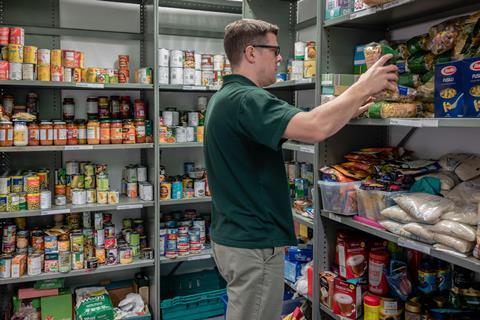Church-based food banks, homeless shelters and warm hubs have all grown at an incredible rate in recent years. But are they really working to reduce poverty?
On a cold night in late November, I was running our church’s drop-in evening meal called The Vine. Each week, around 30 people come along for some company, a quiz and a good hot meal. It’s a modest but positive contribution to our community’s wellbeing.
Our guests have a wide range of needs, but what most struck me that evening was the increasing number who were rough sleeping in freezing conditions. One of our street homeless guests was struggling with a severely infected leg wound. We phoned a doctor who is part of our church to ask for advice, renewed his disintegrating dressing and sent him off to A&E.
I’ve been working with people affected by homelessness for a long time, but I was deeply affected by the scale of issues we are currently witnessing. The guest’s injury seemed to be a tragic metaphor: so many churches and charities are trying their best to apply first aid to the terrible wounds inflicted by poverty and homelessness. This compassion and kindness is much needed but the underlying conditions just keep getting worse.
I believe we need to think more strategically about what is happening in our communities and what will address these core underlying issues.
As the coordinator of The Vine, I can be tempted to see success as lots of guests coming through the doors and a full rota of volunteers. Both of these are positive. But we need to take a deeper look at what these projects reveal about the state of our country. We must avoid what the prophet Jeremiah accused the religious of in his day: “They dress the wound of my people as though it were not serious. ‘Peace, peace,’ they say, when there is no peace” (8:11).
The past 20 years has seen a significant rise in church-based social action initiatives, from food banks to community supermarkets, larders, debt centres, Street Pastors, night shelters and warm hubs. In many ways, this is evidence of a growing social conscience, especially within the evangelical Church.
But have these forms of social action actually reduced poverty? Have they equipped Christians with a greater sense of justice? Have they been an effective way of witnessing to the gospel of good news? I believe it’s time for us to stop and consider carefully what the future direction should be for Christian social action.
It’s complicated
Social action and community engagement is generally viewed positively, both by those inside and outside the Church. But a hallmark of Christian discipleship should be a willingness to examine the weaknesses of our approaches and be self-critical about the effectiveness of what we are involved in. Sin plagues all human endeavour and our social action efforts are not exempt.
We must always be on guard against pride. That means watching out for the self-satisfied glow which easily clusters around efforts to help others. ‘Successful’ community projects easily become a source of unhelpful pride for some churches.
More deeply, we also need to question the underlying assumption that generosity and good intentions inevitably lead to positive outcomes. The reality is that helping resolve complex social problems is complex. All forms of interventions create ‘moral hazards’ which can displace problems rather than actually deal with them. We need to be honest that authentic transformation, whether for individuals or communities, is hard.

Here are three sins of social action that we may wish to consider more fully:
1. Charity without justice
Dom Hélder Câmara, former Archbishop of Olinda and Recife, Brazil, famously said: “When I give bread to the poor, they call me a saint. But when I ask why the poor are hungry, they call me a communist.” His words capture the inescapable tension between charity and justice.
As Christian forms of community action have grown, it is common to hear people describe it in terms of “social justice”. But most of the growth has actually been within the charitable framework: people giving their time and money to benefit those in need on a voluntary basis.
This generosity is generally applauded by those with influence, perhaps because it does not call for a fundamental shift in power. Power remains in the same hands, and can actually be enhanced by the dynamic of charity. Jesus spoke of this in Luke 22:25-26: “The kings of the Gentiles lord it over them; and those who exercise authority over them call themselves Benefactors. But you are not to be like that.”
We must watch out for the self-satisfied glow which easily clusters around efforts to help others
We need to ask: how does the growth of social action connect to the underlying issues which create the needs in the first place? How much does it challenge the social and economic policies that increase poverty?
In the Old Testament, social justice was enshrined in laws relating to harvesting, selling land, loaning money and debt repayment. These laws limited economic inequity and ensured that justice for widows, orphans and aliens, was not just optional charity. Prophets such as Amos, Isaiah and Micah castigate Israel’s social conditions in these terms: “They trample on the heads of the poor as on the dust of the ground and deny justice to the oppressed” (Amos 2:7).
However charitable and compassionate we are, the underlying Christian commitment must be to justice. Even if the main focus is practical, social action initiatives should contribute to the public discussion about the issues exposed by their work. Inevitably, this involves engagement in politics.
Food banks and night shelters are two forms of church-based emergency provision which have grown rapidly. Both are largely run by people who acknowledge that it’s a tragedy such services need to exist at all. The Trussell Trust have politicised the voluntary efforts of their food bank network by publishing statistics on usage and research about what has driven the rise in demand. The statistics are powerful because the numbers connect to raw experience. These are not written by think tanks, but drawn from frontline engagement.
In homelessness, the fundamental injustice and inequity of the UK housing market lies at the heart of our housing crisis. We need to accept that our practical work has political implications. We should be prepared to speak out on how systems and policies need to change. As Desmond Tutu put it: “Christians should not just be pulling people out of the river. We should be going upstream and seeing who is pushing them in.”
2. Creating dependency
The hard truth is that not all responses to poverty are helpful or effective. Often, there are good motives and strong faith behind people’s generosity and kindness, but there is also a naivety about what actually helps.
In recent decades, there has been much research into what helps majority world countries overcome poverty. Dambisa Moyo’s book Dead Aid (Penguin) argues that aid given by richer countries actually disempowers poorer countries and makes their poverty worse. We must grapple with this in our response to UK poverty, too. In homelessness, the emphasis on giving out food and practical resources often falls into this area. It responds to an immediate need, but is it effective in helping people resolve the issues they face?
In his book Toxic Charity (HarperOne), US activist Robert Lupton defines the problem as “Dependency. Destroying personal initiative. When we do for those in need what they have the capacity to do for themselves, we disempower them.”
Alongside practical and charitable work, the underlying Christian commitment must be to justice
In his follow-up book, Charity Detox (HarperOne), he further analyses the problem: “We respond generously to stories of people in crisis, but in fact most of our charity goes to people who face predictable, solvable problems of chronic poverty. An emergency response to chronic need is at best counterproductive and, over time, is actually harmful.”
The ‘crisis’ approach is easy to fall into because these approaches are straightforward, easier to set up and popular with volunteers. The growth in UK social action over the last 15 years has not been in projects focusing on empowerment but mainly those services which distribute freely in the way Lupton critiques: “And yet, charities and churches continue to use crisis-intervention strategies that foster dependence…they continue to feed a man a fish, when they really need to teach him how to fish.”
Empowering people to overcome their chronic issues is harder but far more important. Teaching ten people to cook for themselves might be more beneficial than giving free food to 100 people.
We urgently need a conversation about how social action initiatives make a shift towards a more empowering way of working. Some positive examples of this include the growth of food pantries and community groceries, where people become members and pay an affordable amount for food. Church-based social businesses, like Grace Enterprises in Nottingham, empower people affected by homelessness and poverty by supporting them into work. These are some of the most exciting initiatives in Christian social action.

3. Secularisation
Despite the ongoing rise of Christian social action projects, one of the constant challenges is how church-based organisations and projects maintain an active connection with the faith that birthed them. The homeless sector is full of agencies which used to be Christian.
Sometimes faith fades due to a lack of passion, commitment or departure of a key person. Sometimes it is lost due to fear of what funders think. Sometimes faith become fossilised with the token involvement of the founding church. Rather than something dynamic and creative at the heart of the organisation, faith easily becomes little more than a slightly embarrassing footnote in a charity’s history.
There are many reasons why this happens. Some are to do with the post-Christendom context in which we work. Some are to do with the challenges of conforming to employment law, equal opportunities and regulation. Some are to do with a lack of theological confidence. We desperately need more people who are comfortable expressing their faith openly and confidently within secular contexts. People who are able to bridge the gap between the ‘religious’ worlds of church, theology and spirituality, and the ‘professional’ worlds of strategic partnerships and statutory funding.
Teaching ten people to cook might be more beneficial than giving free food to 100
There is clear evidence that we are moving into a ‘post-secular’ space. In 2013, research agency Lemos & Crane surveyed homeless people on their views on faith and spirituality. The report sharply criticised the ‘secular orthodoxy’ of the homeless sector which better reflected the liberal perspectives of staff than the homeless people themselves.
Five years ago, I was seconded into central government as an advisor to the Rough Sleeping Initiative, with a specific focus on the role of churches and faith groups. There is a growing openness – in both national and local government – to the role Christians play in making a difference.
I have seen a significant rise in discussions at conferences around issues of love, purpose and ultimate meaning. There is a growing confidence in the relevance of faith and a pushback against the idea that it needs to be diluted or ‘skimmed’. Some of the most exciting work is happening where there is a commitment to a ‘full-fat’ approach. Christians Against Poverty, as well as the organisation I lead, Hope Into Action, have integrated professional excellence and spiritual passion in ways that enhance and reinforce each other. They have won many professional awards while maintaining a strong commitment to their Christian distinctiveness.
Loving God and loving your neighbour are the core demands of Christianity. While many social action projects have been excellent at developing people’s love for their neighbour, we need to keep faith in God at the heart of our work. What God has put together, let no one separate.
A better way
Anyone involved in Christian social action will be familiar with Micah 6:8: “Act justly…love mercy and…walk humbly with your God.”
One of the most insightful expositions of this verse is in Lupton’s Toxic Charity: “Justice and mercy twinned together, these commands lead us to holistic involvement. Divorced, they become deformed. Mercy without justice degenerates into dependency and entitlement, preserving the power of the giver over the recipient. Justice without mercy is cold and impersonal, more concerned with rights than relationship.”
The verse from Micah offers us a three-fold response to the sins of social action.
The homeless sector is full of agencies that used to be Christian
“Acting justly” means connecting action to advocacy. We need to speak up about the underlying issues of injustice that perpetuate poverty. And we need to use examples from what we see on the frontline of our work. When advocacy becomes detached from real action, it becomes warped by the ideology and the politics of the culture wars. We need to argue for structural justice in areas such as affordable housing, taxation and fair wages.
“Loving mercy” means connecting compassion to empowerment. This will require us to repent of those actions which disempower and create dependency, where we have got stuck in a perpetual cycle of delivering crisis responses to problems that are chronic in nature. We need to strive for relationships which are genuinely more merciful. This will mean being brave enough to radically reshape projects and initiatives to create more empowerment and greater mutuality.
“Walking humbly with God” means integrating activism and faith. We need to be honest about the widespread dilution and erosion of faith in Jesus within the social action organisations that faith has originally birthed. We need to commit to improving how faith is expressed and integrated in social action in non-coercive, creative and confident ways. We need to embrace the opportunities that our cultural moment affords. Our social action should be a great illustration of our faith in Jesus, not something that masks it.
The most important factor of all is that Christian social action remains faithful to its source: to the God revealed in Jesus who calls us to follow him in word and deed. We must remember that reflecting his grace and truth is the best gift we can give to any community or any individual. In the words of missionary theologian Lesslie Newbigin: “The commitment is not to a cause, or a programme but to a person – at the heart of Christian mission must remain a commitment to serving Christ in his community.”
Hope into Action’s annual conference will take place on 7 March. See hopeintoaction.org.uk for details






































No comments yet